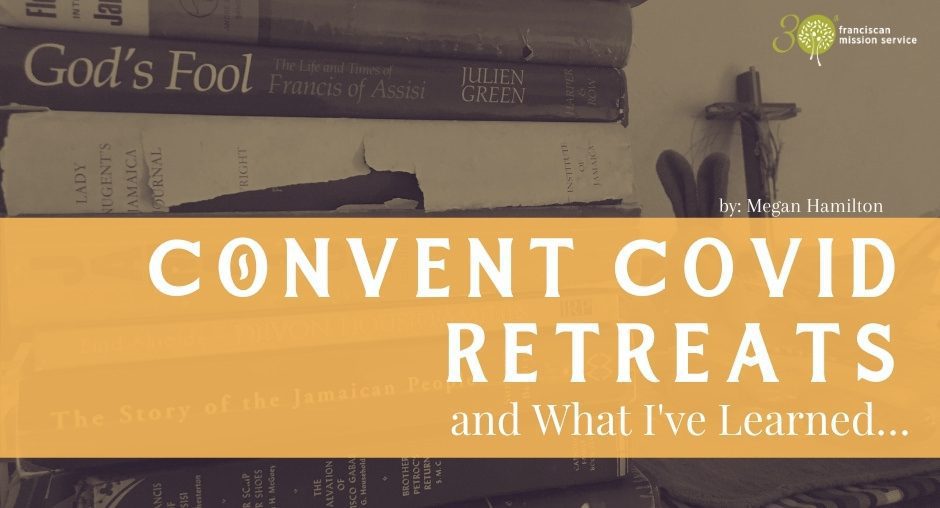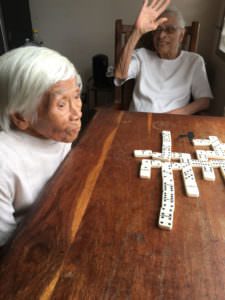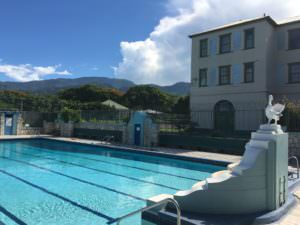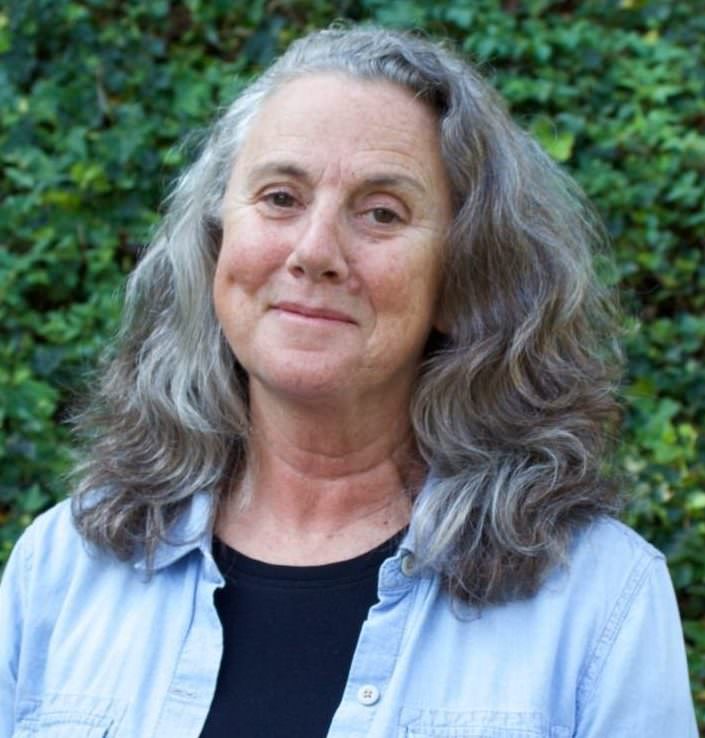Convent COVID Retreats and What I’ve Learned…

Editor’s note: Megan Hamilton, an FMS missioner serving in Kingston, Jamaica reflects on her time during the pandemic, the many things she has learned, the idea of intentional luxury, and what it means to truly live the Franciscan charism.
I’ve spent most of the last six months self-quarantined in an historic building in Kingston, Jamaica that began its life as a luxury hotel, spent the last eighty years as a convent, and is currently home to nine Franciscan Sisters and four special guest- type, long-term residents including…me!
Watching the silvery-gold sunlight wash the lush, century-old trees beyond my balcony, I’ve felt (a bit guiltily) like a medieval aristocrat in Boccaccio’s The Decameron, hiding in the Tuscan countryside away from Florence, hoping the clear, strong winds will blow the Black Plague away. It feels kind of luxurious. Not like the first few definitions of luxury in the ginormous, old dictionary I borrow from the common room: “a state of great comfort and elegance, especially when involving great expense.” Nope. That isn’t it. It isn’t fancy food, fancy clothes, buckets of money. We don’t have AC. I don’t consider my linoleum floor elegant. It is more like the fourth definition: “pleasure out of the ordinary allowed to oneself.”
My pleasure has been time. Living in a beautiful, contemplative space, I’ve had time to serve my ministries, time to go to new places in my heart, soul, body, and mind. But my convent COVID retreat is retreating. Days are shorter, shadows longer. Cool isn’t a word that applies here but the searing heat subsides. A friendly lady cleans the pool house, which, except for me, has been empty, dusty for half a year. On an early morning, nervous dads in masks walk their sleek, young gal athletes out back to run the green Pitch. The too small parking lots on campus fill as teachers at the two Immaculate schools start prepping for the hardest semester in an over 150 year history.
In the transition back to a normal that will never return, I wonder: what have I learned?

Sister Mags offers up a happy wave from the Infirmary where she and Sister Goretti and I are having a game of Free-Form Dominos. Mags LOVES dominos!
I know it is easy for me to love old ladies with dementia, to enjoy their myriad realities, festively untethered from the norm, respecting their courage coping with big challenges. In the Infirmary I celebrate the luxury of time spent with three marginalized souls in an overlooked corner of the world.
I know it is easy for me to love drunks and addicts who really want to get sober. To have time to start a new women’s meeting, spend HOURS on the phone with gals who are trying to figure out how to process the pain another way.
I know it is easy for me to love playing crossing guard at the intersection out front as pushy, swanky SUV’s race off to the golf course, and elders with heart and endurance stand under a fierce sun to get what they need, awaiting their food and medications. Our chats are blessings to me.
I know I am a volunteer missioner happy to be in scrappy Kingston. I love its potholed sidewalks, crazy dangerous traffic, barbed wire topped fences, new words and new ways, and kind, friendly people free of that burden of more luxurious countries: big-time sense of entitlement.
I know I am for real a Catholic. I’m living in a frickin convent! The light-filled chapel hasn’t missed a beat for six-months, and many evening masses I go downstairs coming out a centered, more joyous woman than when I went in.
I know I AM better. Physically. I’ve lost fifteen pounds. I swim pretty near daily. I’ve run the open air corridors and stairs of the schools without students and come up with some pretty awesome pool workouts. I know when I finally settle down, and stay put somewhere I will need a swimming option.
I’ve learned that while much of Jamaica is closed her books are open.
I can tell you that the indigenous Taino invented the word avocado but Jamaicans call them pears. The island has a dizzying array of native species, including 21 types of toads. There is a mango called Sweetie Come Brush Me. If you don’t prepare the national fruit (ackee) correctly you could die.
I can tell you Paul Bogle, the leader of the 1865 Morant Bay Rebellion was turned over to the British to be hanged, by fellow free men of color, the ever surviving Maroons, and that when I read that I almost cried. I know that Denzel Washington should play Jamaica’s first black millionaire Charles Stiebel, who (to name just a few highlights) ran guns to slave revolutionaries in Cuba, swam ashore when his fleet of ships wrecked off the coast of Venezuela, starting over there with not much more than a peddler’s cart, discovered gold, and finally came back to Kingston to build a mansion so luxe it offended the racist wife of the Governor, who demanded the still extant Lady Musgrave Road be built so she could detour cross town without having to look at Stiebel’s elegant, and still standing, Devon House.
I can tell you that Robert Nesta Marley’s nickname was Tuff Gong, his mother was Catholic, and that he stood on a Kingston stage just 48 hours after surviving an assassin’s bullet, keeping his pledge to the 80,000 assembled to perform a free concert preaching unity at a time when the city streets were vicious, bloodied war zones.
I could go on about women like Nanny, the semi-mythic Maroon leader immortalized on the Jamaican 500 dollar bill. Or doctress Mary Seacole, whose action- packed life reads like Stiebel’s with the headline of her having treated the troops in the Crimean War even though she’d been told her skin color should prevent her from being there. Or poetess/comedienne/folk arts champion Miss Lou who taught generations of Jamaicans to prize their culture and speak Patwah if they damn well pleased.
Jamaica’s history feels unexpectedly huge, a Dostoyevsky-ish epic with an island the size of Connecticut. Its diaspora sent out lives impacting the planet: Marcus Garvey, Harry Belafonte, Bob Marley, Usain Bolt, Kamala Harris. I have had the luxury of reading this with free time daily, sitting at 4:30 under my mango tree.

Oh ok. There is SOME true luxury at Immaculate Conception Convent. Our pool opened in 1931 with poinciana trees and the Blue Mountains in the distance.
And finally, in the quiet of these past months, hardly going anywhere, contentedly watching my clothes dry on the racks, praying my first Novena, I’ve come to feel more Franciscan. St. Francis was a man who knew the first definition of luxury, selling superb fabrics to the aristocrats of Assisi, showing them up at their games of stylish dress, feasting, and singing. He ecstatically gave it all away for time, time to be with God, in the woods, helping the poor and preaching to all, including the animals.
I think of him when I leave the pool. Most mornings a lizard I’ve named Little Tum Tum, (she has a white belly!), flops out of her flowerpot to greet me. We have a lovely, wee moment. I chat, and she watches with her shiny black eyes, listening with quick, clipped turns of her head. Before I leave, I bless her with the sign of the cross said in the name of St. Francis. Leaving I think that many might find that odd, and I think comfortably, that’s ok too. We all have our own definitions of luxury.
Tagged in:

